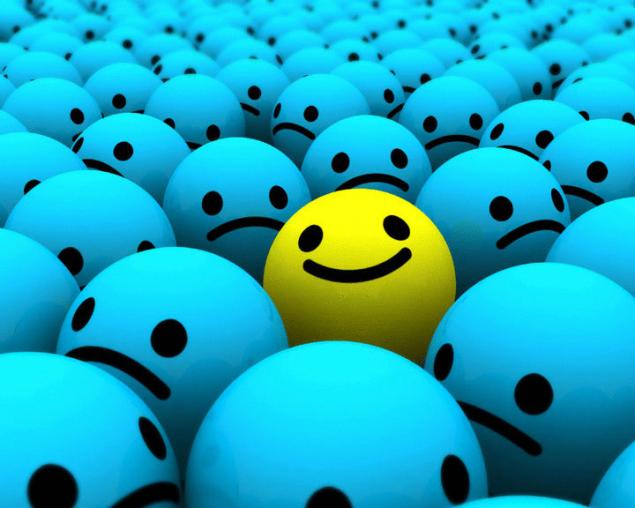Scientists on the impact of the crowd on personal moral values
 Bashny.Net
Bashny.Net
When we are among friends and like-minded people, our brain shuts down the area of the cortex responsible for the maintenance of personal moral attitudes.

Each person has ideas about what is good and what is bad. But no matter how immutable these ideas may seem, they often fail when a person is in a crowd or just a group of like-minded people. And then people talk about "double standards": each of us, for example, believes murder is unacceptable, but at the same time, many are willing to make an exception for the representative of any opposing party. Specific examples of lead will not, here, simply to refer to the socio-political events, though the present, even thousands of years ago.
Situations when a person thinks one thing and does another, there are many, however, group behavior is a versatile and very striking example. Indeed, it is difficult to find a man who can always resist the instinct of the crowd. (Once again we emphasize that under crowd includes not only the gathering of people in a few hundred thousand people, but close-knit team of any office, institution or simply school class.) One explanation for this phenomenon is that in a group people can act anonymously when it seems that no one knows what you did. As an option – in the group we feel a kind of collective responsibility, reducing the sense of personal guilt. So our personal settings about what is good and what is bad, be out of work.
Researchers from mit and Carnegie Mellon decided to combine psychological explanations of group moral instability by observing brain activity. Using functional MRI, they watched the activity of the middle prefrontal cortex, which is activated when a person thinks about himself. Within two weeks volunteers who agreed to participate in the experiment, were interviewed about their moral beliefs and behavior, while the researchers are interested in how people behave in social networks. Eventually managed to formulate some statements that related to each specific volunteer and giving an idea of its moral precepts, for example, "I'm always sorry when I come across someone on the street, or I take someone else's food from the communal fridge".
Then the experiment participants were asked to play a game where I had to press the button when they saw a statement related to social networks – for example, "I have over 600 friends on Facebook". Such phrases were interspersed with phrases about personal moral values. The game was released in two variants: in one the man was all by himself in another team, but in each case was the enemy, that is the person or team who had to beat.
Researchers were interested in how the area of the brain responsible for mood, will respond to allegations of moral and immoral character. Analysis of fMRI data showed that the average prefrontal cortex was activated just on moral claims (like "I'm always sorry when I come across someone on the street") and remained indifferent to the facts about the social networks (like "I have over 600 friends on Facebook"). However, this pattern was observed only in the case if the person played for himself. If the game was a team, this area of the cortex was silent on the moral statements too. We can say that teamwork was turned off in the brain system responsible for the realization of moral principles.
After the game, the person was asked to choose photos of its members and the opposing team, ostensibly for publication in the report. In cases where the activity of the middle prefrontal cortex was reduced, players try to choose their opponents for photos worse than his own team. It can be regarded as the willingness to harm another who is not a member of your group, team, crowd, etc. That is, the suppression of moral areas of the brain led to a specific (and not too pleasant) psychological effect. (It should also clarify that identity in General is not concentrated in only one average prefrontal area of the cortex; in this case, the researchers discuss only the aspect of self-reflection, which is linked to the assessment of himself in light of personal moral beliefs).
In an article published in журналеNeuroImage, the study authors emphasize that not all people teamwork inhibited the activity of the ethics center's crust. This means that some people are more prone to immoral influence of team and more likely than others to forget their own moral values in a circle of friends and associates. In addition, after the game it was even harder to remember the moral approval, which they recently showed. Individual differences can explain why some people quickly lose their opinion and go on about the group than others. The researchers also suggested that such people are worse than finding yourself in the group photos, but this interesting hypothesis remains to be tested experimentally.
In General, the findings confirm the well-known observation that there are those who more readily follow the majority, and there are those that can resist, so to speak, the charm of collective action. However, it is worth remembering that we are not talking about a deliberate betrayal of their own beliefs – they simply disappear. However, there can be ask, how have the ability to forget moral principles, the role of childrearing, and whether some own strong-willed efforts to change a setting of his own brain. But this is, again, a topic for further experiments.
Source: nkj.ru

Each person has ideas about what is good and what is bad. But no matter how immutable these ideas may seem, they often fail when a person is in a crowd or just a group of like-minded people. And then people talk about "double standards": each of us, for example, believes murder is unacceptable, but at the same time, many are willing to make an exception for the representative of any opposing party. Specific examples of lead will not, here, simply to refer to the socio-political events, though the present, even thousands of years ago.
Situations when a person thinks one thing and does another, there are many, however, group behavior is a versatile and very striking example. Indeed, it is difficult to find a man who can always resist the instinct of the crowd. (Once again we emphasize that under crowd includes not only the gathering of people in a few hundred thousand people, but close-knit team of any office, institution or simply school class.) One explanation for this phenomenon is that in a group people can act anonymously when it seems that no one knows what you did. As an option – in the group we feel a kind of collective responsibility, reducing the sense of personal guilt. So our personal settings about what is good and what is bad, be out of work.
Researchers from mit and Carnegie Mellon decided to combine psychological explanations of group moral instability by observing brain activity. Using functional MRI, they watched the activity of the middle prefrontal cortex, which is activated when a person thinks about himself. Within two weeks volunteers who agreed to participate in the experiment, were interviewed about their moral beliefs and behavior, while the researchers are interested in how people behave in social networks. Eventually managed to formulate some statements that related to each specific volunteer and giving an idea of its moral precepts, for example, "I'm always sorry when I come across someone on the street, or I take someone else's food from the communal fridge".
Then the experiment participants were asked to play a game where I had to press the button when they saw a statement related to social networks – for example, "I have over 600 friends on Facebook". Such phrases were interspersed with phrases about personal moral values. The game was released in two variants: in one the man was all by himself in another team, but in each case was the enemy, that is the person or team who had to beat.
Researchers were interested in how the area of the brain responsible for mood, will respond to allegations of moral and immoral character. Analysis of fMRI data showed that the average prefrontal cortex was activated just on moral claims (like "I'm always sorry when I come across someone on the street") and remained indifferent to the facts about the social networks (like "I have over 600 friends on Facebook"). However, this pattern was observed only in the case if the person played for himself. If the game was a team, this area of the cortex was silent on the moral statements too. We can say that teamwork was turned off in the brain system responsible for the realization of moral principles.
After the game, the person was asked to choose photos of its members and the opposing team, ostensibly for publication in the report. In cases where the activity of the middle prefrontal cortex was reduced, players try to choose their opponents for photos worse than his own team. It can be regarded as the willingness to harm another who is not a member of your group, team, crowd, etc. That is, the suppression of moral areas of the brain led to a specific (and not too pleasant) psychological effect. (It should also clarify that identity in General is not concentrated in only one average prefrontal area of the cortex; in this case, the researchers discuss only the aspect of self-reflection, which is linked to the assessment of himself in light of personal moral beliefs).
In an article published in журналеNeuroImage, the study authors emphasize that not all people teamwork inhibited the activity of the ethics center's crust. This means that some people are more prone to immoral influence of team and more likely than others to forget their own moral values in a circle of friends and associates. In addition, after the game it was even harder to remember the moral approval, which they recently showed. Individual differences can explain why some people quickly lose their opinion and go on about the group than others. The researchers also suggested that such people are worse than finding yourself in the group photos, but this interesting hypothesis remains to be tested experimentally.
In General, the findings confirm the well-known observation that there are those who more readily follow the majority, and there are those that can resist, so to speak, the charm of collective action. However, it is worth remembering that we are not talking about a deliberate betrayal of their own beliefs – they simply disappear. However, there can be ask, how have the ability to forget moral principles, the role of childrearing, and whether some own strong-willed efforts to change a setting of his own brain. But this is, again, a topic for further experiments.
Source: nkj.ru
Tags
See also
The weight of a person influences the number of friends
The kids in the cell: the secrets of the perfect space family communication
SOCIAL NETWORKS. Manipulation of consciousness
Where lead expectations or attempt to survive lemon tomato juice
The rights and-duties: You always have the right of choice!
Archpriest Alexei Uminsky on the subtraction of prayers and formal confession
The most extreme kinds of insects
















